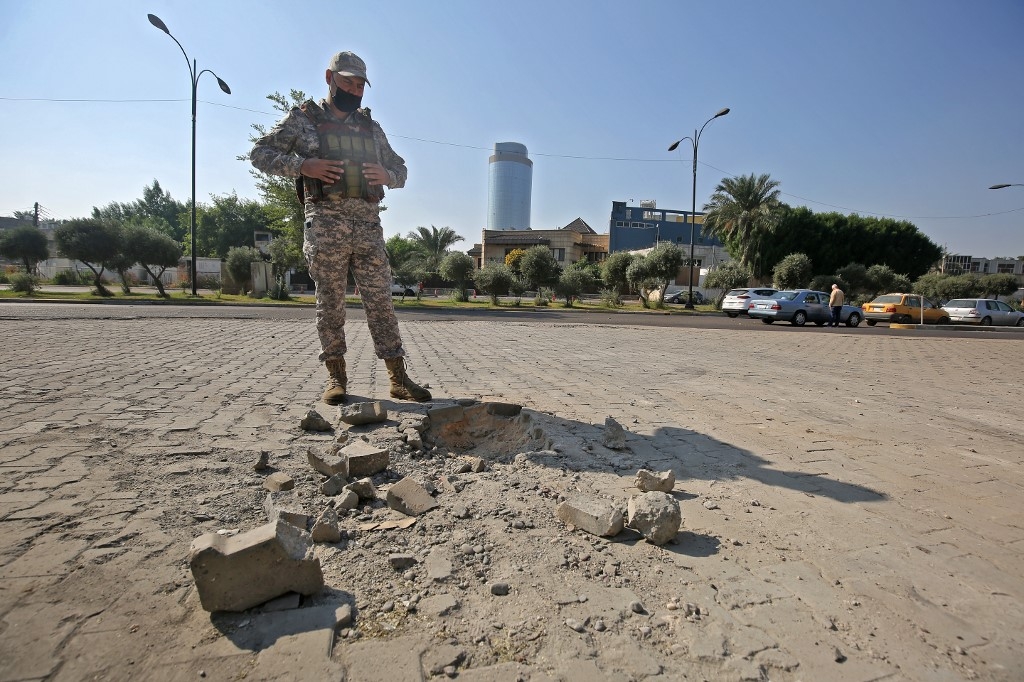'I will hold Iran responsible': Trump warns of retaliation after attacks on Baghdad embassy

US President Donald Trump blamed Iran for a rocket attack on Washington's embassy in Baghdad and said that he would "hold Iran responsible" if any Americans are killed.
"Our embassy in Baghdad got hit Sunday by several rockets," Trump tweeted late on Wednesday, referring to an attack that caused damage but no deaths, and the rockets did not explode.
"Guess where they came from: IRAN.
"Now we hear chatter about additional attacks against Americans in Iraq … Some friendly health advice to Iran: if one American is killed, I will hold Iran responsible. Think it over."
Our embassy in Baghdad got hit Sunday by several rockets. Three rockets failed to launch. Guess where they were from: IRAN. Now we hear chatter of additional attacks against Americans in Iraq... pic.twitter.com/0OCL6IFp5M
— Donald J. Trump (@realDonaldTrump) December 23, 2020
Stay informed with MEE's newsletters
Sign up to get the latest alerts, insights and analysis, starting with Turkey Unpacked
In Sunday's attack, a barrage of rockets hit the US embassy in Baghdad's heavily fortified Green Zone, Iraq's military said, sparking fears of renewed tensions between the US and Iran.
An Iraqi military statement said eight rockets were launched by "an outlawed group", wounding one Iraqi security officer and damaging cars and a residential complex.
US Central Command, which oversees US troops in the Middle East and Central Asia, said a total of 21 rockets were launched, making it the largest rocket attack on the US embassy in roughly a decade.
Citing two sources, Axios reported that the US is considering closing its Baghdad embassy following the attacks.
'Catastrophic failures at home'
Iranian Foreign Minister Mohammad Javad Zarif responded to Trump on Twitter, saying placing "your own citizens at risk abroad won't divert attention from catastrophic failures at home".
A spokesman for Tehran's Foreign Ministry also condemned the accusations, saying they fall under the umbrella of "repetitive, baseless and fabricated allegations" aimed at smoothing out "the very difficult situation Trump is in".
"As has been announced numerous times before, attacks on diplomatic and residential areas is rejected," Saeed Khatibzadeh said, denying that Tehran was behind the attack.
"In this specific instance, the accusations lie with the US itself and its allies in the region who are after increasing tensions."
The Trump administration, with one month left in office, has been working to slowly reduce its 3,000 troops in Iraq.
Still, the White House remains concerned that Iran-backed groups in Iraq may retaliate against Americans leading up to the one-year anniversary of the US assassination of Iran's top general, Qassem Soleimani.
On Wednesday, Acting Defence Secretary Chris Miller, Secretary of State Mike Pompeo and National Security Adviser Robert O'Brien met at the White House to prepare a "range of options" for Trump aimed at deterring further attacks, multiple news outlets including CNN and the Wall Street Journal reported.
Middle East Eye delivers independent and unrivalled coverage and analysis of the Middle East, North Africa and beyond. To learn more about republishing this content and the associated fees, please fill out this form. More about MEE can be found here.





